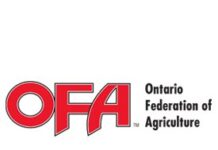by Paul Maurice,
Director, Ontario Federation of Agriculture
For livestock farmers, it’s an unfortunate reality that sometimes, animals die on the farm from causes beyond human control. When that happens, it’s important that those animals are handled and disposed of responsibly and properly, and without impact on human or animal health, or the environment.
In Ontario, the livestock industry depends mostly on rendering – a highly regulated process that turns deadstock safely into new, useful products – as a solution, but increasing restrictions and challenges are making management challenging for both farmers and rendering companies.
That’s why the Ontario Federation of Agriculture (OFA) joined together with provincial livestock organizations to request help from the Ontario Ministry of Agriculture, Food and Rural Affairs (OMAFRA) to address the livestock mortality issue with both short and long‑term options that will result in practical and sustainable solutions.
The study recommends the setting up a coordinating body, ideally led by an existing organization, to ensure ongoing development and implementation of solutions that respect geographic differences and the needs of the various livestock sectors in Ontario.
Continued investment in sustainable deadstock management is another recommendation, particularly ensuring ongoing, uninterrupted collection, and building a business case for the value deadstock could offer a circular economy, including to waste management companies.
The report also recommends a review of existing deadstock regulations to ensure they’re based in science, avoid overlap and allow the industry to take advantage of new opportunities presented by sustainable circular economies.
In the winter, OFA hosted a presentation of the initial study results to farmers and industry stakeholders as part of our annual Research Day. Following that, OFA also took part in a stakeholder meeting, where farm organizations, government, renderers, waste disposal companies and others discussed the study’s findings and concluded that a working group should be formed to work towards a more coordinated approach to deadstock management and develop next steps.
It should also be noted that the challenge of sustainable deadstock management is not unique to Ontario. The international scan conducted as part of the study showed that not only is there no single solution that works for all farmers or all livestock species, but countries around the world are looking for answers to the same problem.
Deadstock is a serious concern that our agri‑food system needs to deal with collectively so that we can avoid impacts on human health and the environment and minimize risk to Ontario’s livestock herds.


